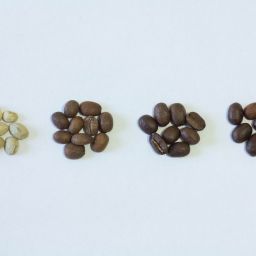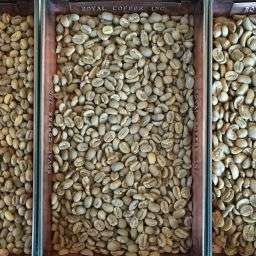
100% Arabica coffee beans are renowned worldwide for their superior quality and distinctive taste. Sourced from the Arabica species of coffee plants, these beans are preferred by coffee connoisseurs and enthusiasts alike for their delicate flavors and aromatic profiles.
Unlike their Robusta counterparts, Arabica beans thrive in high altitudes, contributing to their unique taste and making them a staple in premium coffee offerings.
History and Origin
The journey of Arabica coffee began in the 9th century in Ethiopia, where it is believed the first coffee plants were discovered. The term “Arabica” itself derives from the Arabic word for coffee, “qahwa,” often referred to as the wine of Arabia.
From Ethiopia, Arabica coffee spread globally, becoming the backbone of the coffee industry. Its widespread popularity is not just due to its delightful flavor but also to its rich history and cultural significance, embodying centuries of tradition in every cup.
Health Benefits
The health benefits of 100% Arabica coffee are impressive, attributed to its high content of essential vitamins and minerals such as Vitamin B2 (Riboflavin), B3 (Niacin), B5 (Pantothenic acid), and Vitamin E, along with magnesium, potassium, and iron.
Arabica beans are also rich in antioxidants, which play a crucial role in neutralizing harmful free radicals in the body, potentially reducing the risk of chronic diseases.
Furthermore, Arabica coffee boasts a lower caffeine content compared to Robusta, offering a gentler alternative for those sensitive to caffeine. Its reduced acidity makes it more stomach-friendly, while its antioxidants can aid in inflammation reduction, showcasing Arabica’s balance between indulgence and well-being.
Diving Deeper into Arabica Coffee
Flavor Profile
Arabica coffee is celebrated for its sweet, bright, and floral notes, distinguishing it from other coffee varieties. This complexity arises from the bean’s inherent characteristics and the environmental conditions in which it is grown.
Arabica beans flourish in high altitudes, where the cooler temperatures and varied rainfall contribute to a slower maturation process. This extended growth period allows the beans to develop a fuller flavor profile, characterized by a rich body, vibrant acidity, and hints of fruit and berries.
The soil quality and specific climate conditions of each region also play crucial roles in shaping these flavors, making the terroir a vital component in the unique taste of Arabica coffee.
Growing Regions
The prime regions for cultivating Arabica beans are Central and South America, Africa, and Indonesia. Each of these locales offers a unique set of climatic and geographical advantages that contribute to the distinct flavors of their Arabica coffee.
For instance, the volcanic soil in parts of Central America imparts a subtle sweetness and complexity to the beans, while the high altitudes of East Africa are known for producing beans with vibrant acidity and fruity notes.
Similarly, Indonesia’s tropical climate yields Arabica beans with a fuller body and richer, earthier flavors. These diverse growing conditions ensure a wide range of flavors among Arabica coffees, catering to an array of palates.
Varieties of Arabica Coffee
There are several varieties of Arabica coffee, each with its own distinct flavor profile. These include Typica and Bourbon, which are considered the original coffee varieties from which many others have been developed.
Typica beans are known for their sweet, clean taste, while Bourbon beans offer a slightly more complex flavor with a balanced acidity. Other notable varieties include Geisha, celebrated for its floral and citrus notes, and SL28, known for its bright acidity and berry-like qualities.
The diversity among Arabica varieties allows for a broad spectrum of flavors and aromas, making each cup a unique experience.
Arabica vs. Robusta
Arabica and Robusta beans are the two most common coffee species, each with distinct characteristics. Arabica beans are preferred for their complex flavor profiles, featuring sweet, fruity, and floral notes with a higher acidity and a smoother finish.
In contrast, Robusta beans have a stronger, more bitter taste with a higher caffeine content and a grainier mouthfeel. They are often used in espresso blends for their ability to produce a rich crema and add body to the coffee.
While Arabica dominates the specialty coffee market due to its superior flavor, Robusta holds its own in the industry by offering a cheaper alternative that is more resilient to pests and diseases, making it a popular choice for commercial blends and instant coffee.
The choice between Arabica and Robusta often boils down to personal preference and the desired balance between flavor complexity and caffeine strength.
FAQs
What makes 100% Arabica coffee beans unique?
100% Arabica coffee beans are distinguished by their superior flavor profile, which includes sweet, fruity, and floral notes, along with a higher acidity compared to other coffee species.
These beans are grown in high-altitude regions, which contributes to their distinct taste and quality.
How does the flavor of Arabica compare to Robusta?
Arabica beans offer a more complex and nuanced flavor profile, with a smooth finish and hints of fruit and flowers. Robusta, on the other hand, tends to have a stronger, harsher taste, with a higher bitterness and caffeine content, making it less favorable for those seeking a delicate coffee experience.
Are there health benefits to choosing Arabica over Robusta?
Yes, Arabica coffee is generally lower in caffeine and acidity compared to Robusta, making it a gentler option on the stomach. The higher antioxidant levels in Arabica can also provide health benefits, including reduced inflammation and protection against free radicals, contributing to overall well-being.
Conclusion
Throughout this exploration into 100% Arabica coffee beans, we’ve highlighted their unique flavor, the diverse regions where they’re grown, and the various health benefits they offer over Robusta beans.
Arabica’s rich, nuanced taste profiles and its historical significance have solidified its status as the preferred choice among coffee aficionados.
Embracing Arabica coffee not only promises a superior taste experience but also aligns with a healthier lifestyle choice, underscoring its revered position in the world of coffee.








